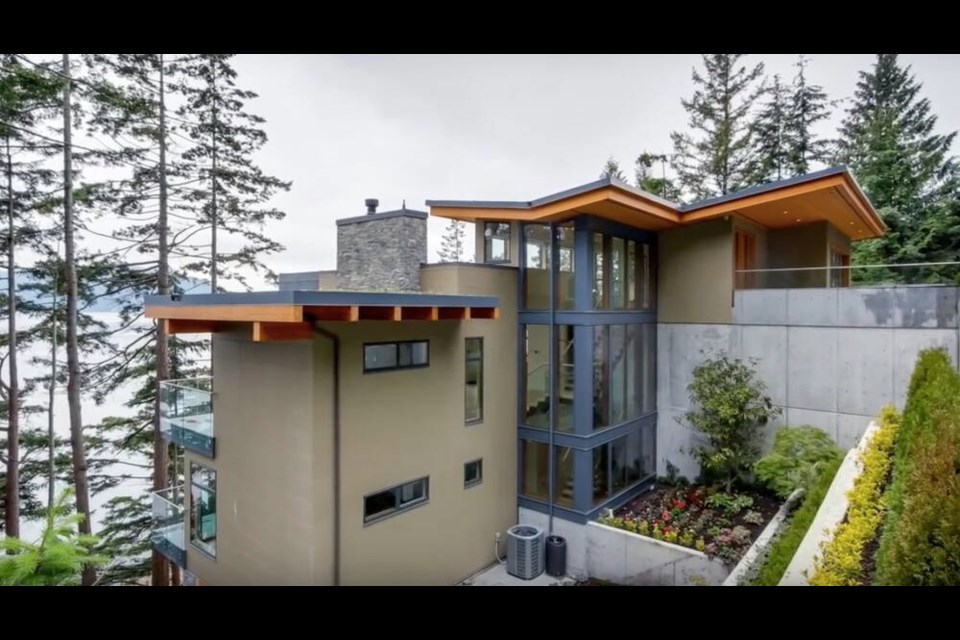A West Vancouver property owner has failed in his second court challenge to halt the construction of his neighbour’s home.
The legal dispute relates to two properties on Citrus Wynd – a secluded road with steep, waterfront properties facing Howe Sound just north of Horseshoe Bay.
In 2012, the district granted a development permit that would allow two similar homes, which were both designed by the same architect, on two adjacent properties, a recent Court of Appeal ruling states.
One was built on Citrus Wynd in 2015 and eventually purchased by its current owner, Philipp Blanke, in 2019.
In 2018, another couple had already applied for a development permit to allow a similar home on the neighbouring lot, which the district’s director of planning granted. The building permit was approved in 2019. The pandemic, however, delayed the start of construction beyond the development permit’s 24-month time limit, and Blanke assumed it had expired.
When Blanke saw construction beginning, he learned the district’s director of planning had agreed to extend the permit with minor changes in 2023.
Blanke approached the couple and their architect with concerns about the building’s height and its siting on the property, asking for changes that would “maintain his access to light and preserve his privacy.”
“The appellant was unhappy with the impact of the [couple's] building plans on the use and enjoyment of his property,” B.C. Court of Appeal Justice Barbara Fisher summarized in her March 21 ruling.
Blanke took the District of West Vancouver and his neighbours to B.C. Supreme Court, alleging the district had failed to follow its own processes because, he argued, the director of planning did not have the authority to extend the 2018 permit. He also claimed he was entitled to be informed and consulted before any changes in the permits were made.
In May 2024, the court dismissed Blanke's petition. In January, Blanke took the matter to the B.C. Court of Appeal, arguing the lower court judge had made errors in law.
Specifically, Blanke asserted the B.C. Supreme Court judge was wrong to conclude all of the district’s decisions were reasonable and that the district hadn’t breached any rules around procedural fairness.
In virtually all instances, the three-judge panel at the B.C. Court of Appeal sided with the district.
“The appellant’s arguments throughout this dispute have focused on narrow and highly technical legal issues arising out of the zoning and procedures bylaws,” Fisher wrote, acknowledging that “reasonableness” should be considered in the context of the district’s legislation and decision-making powers. “This approach also fails to appreciate the prejudice to the [neighbouring couple], who have simply been doing their best to navigate through the rather complex web of regulations and approvals they require in order to build a home on their property.”
The couple had already spent more than $900,000 in consulting fees, permits and site work required prior to the construction of their home, the judge noted.
The panel also upheld the lower court’s finding that the district hadn’t breached the rules of procedural fairness.
“In the context here, the appellant’s interests in the 2023 renewal are clearly subordinate to the interests of the [neighbouring couple], to the extent that he had no statutory right to be heard by the district. Despite this, he did manage to communicate his concerns to the district and to the couple, as frustrating as that process may have been for him,” Fisher wrote. “As for the appellant’s legitimate expectations, there is nothing on the record before us that could amount to a clear, unambiguous and unqualified assurance from the director or other staff that he would be notified and consulted prior to the issuance of the 2023 renewal.”
[email protected]
twitter.com/brentrichter
brentrichter.bsky.social
Want to stay updated on North Vancouver and West Vancouver news? Sign up for our free daily newsletter.


